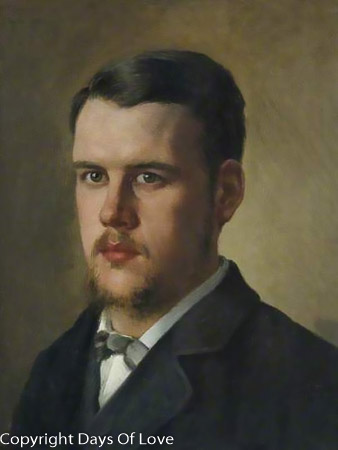

Queer Places:
University of Cambridge, 4 Mill Ln, Cambridge CB2 1RZ
Barnards Inn, 86 Fetter Ln, London EC4A 1AD, Regno Unito
 Henry
Festing Jones (30 January 1851 – 23 October 1928)[1]
was an English solicitor and writer, known as the friend and posthumous
biographer of
Samuel Butler.[2][3]
Henry
Festing Jones (30 January 1851 – 23 October 1928)[1]
was an English solicitor and writer, known as the friend and posthumous
biographer of
Samuel Butler.[2][3]
He was the son of Thomas Jones Q.C., and entered Trinity Hall, Cambridge in 1870.[4] Graduating B.A. in 1873, he was articled to a solicitor. He qualified in the profession in 1876.[3]
Jones met Samuel Butler through Edward Hall, a college friend; they became close in 1876.[2] From 1887, he was Butler's paid companion and musical collaborator.[5] Butler had settled in 1864 in Clifford's Inn, London, where he lived for the rest of his life, dying in 1902;[6] Jones lived in Barnard's Inn and Staple Inn during Butler's lifetime.[7][3]
After Butler's death, Jones moved within London to Maida Vale, where his sister kept house for him.[3] He advised Butler's executors (Reginald Worsley, and R. A. Streatfeild who was literary executor).[8] He organised annual "Erewhon Dinners" in Butler's memory, from 1908 to 1914, at the suggestion of Marcus Hartog.[9][10] P. N. Furbank has criticised the editorial stance Jones took, and the effort to make Butler "respectable", of the years before the Memoir appeared.[11]
In 1910 Jones met Francis Darwin, in an attempt to give closure to the feud between Butler and Charles Darwin that had arisen around 1880; there resulted his pamphlet Charles Darwin and Samuel Butler: A Step toward Reconciliation (1911).[12]
Jones published a well-regarded selection The Note-Books of Samuel Butler (1912), after Desmond MacCarthy had seen the originals, and published extracts in the New Quarterly Review.[13][8] The editing of this work has been seen as involving false emphasis and polishing of the originals, producing an effect of a "cross between Oscar Wilde and Dr Johnson".[14] His biography of Butler, entitled Samuel Butler, Author of Erewhon (1835–1902) — A Memoir, won the inaugural James Tait Black Memorial Prize for biography in 1919.[15]
Jones edited Butler's works with Augustus Theodore Bartholomew, known as Theo and a librarian and bibliographer in Cambridge, in 20 volumes appearing 1923–6.[16] On Bartholomew's death in 1933, Geoffrey Keynes became his literary executor, taking on also the papers of Jones and Butler, acting with Brian Hill.[17][18]
Through Theo Bartholomew, Jones came to know Siegfried Sassoon, meeting after World War I; Sassoon and others knew him as "Enrico". They corresponded, and Sassoon found Jones a sympathetic audience.[19][20] Bartholomew and Mansfield Forbes visited Jones, and gave him "guru" status.[21] Geoffrey Keynes and his wife were good friends.[18]
Jones was a student of the Opera dei Pupi.[22] Butler had visited Sicily almost annually in the last decade of his life, usually with Jones.[23]
My published books: